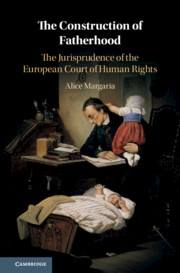Book contents
- The Construction of Fatherhood
- The Construction of Fatherhood
- Copyright page
- Dedication
- Contents
- Foreword
- Acknowledgements
- Introduction
- 1 Fatherhood and the Law in Europe
- 2 The ECtHR and Fatherhood: Limits and Potential
- 3 Fatherhood and Assisted Reproduction
- 4 Post-Separation and Unmarried Fatherhood
- 5 Fatherhood and Family–Work Reconciliation
- 6 Fatherhood and Homosexuality
- 7 Fatherhood at the ECtHR
- Bibliography
- Index
5 - Fatherhood and Family–Work Reconciliation
Published online by Cambridge University Press: 21 November 2019
- The Construction of Fatherhood
- The Construction of Fatherhood
- Copyright page
- Dedication
- Contents
- Foreword
- Acknowledgements
- Introduction
- 1 Fatherhood and the Law in Europe
- 2 The ECtHR and Fatherhood: Limits and Potential
- 3 Fatherhood and Assisted Reproduction
- 4 Post-Separation and Unmarried Fatherhood
- 5 Fatherhood and Family–Work Reconciliation
- 6 Fatherhood and Homosexuality
- 7 Fatherhood at the ECtHR
- Bibliography
- Index
Summary
This chapter tracks the Court’s attachment to and/or departure from ‘conventional fatherhood’ in the context of family–work reconciliation. Historically, fatherhood has been understood as profoundly tied to employment. In as much as it enables a father to secure adequate housing and financial support for his family, employment represents, in fact, the ‘way of meeting the expectations of the providing facet of fatherhood’. Although constructed as a sign of commitment and, thus, as an expression of paternal love, however, employment is also likely to alienate fathers from the realm of family life and, therefore, to hinder the development of emotional ties with their children. These dynamics are, at the same time, the cause and the effect of a gendered division of labour that considers breadwinning as the essence of the paternal role and childcare as the primary responsibility of mothers.
- Type
- Chapter
- Information
- The Construction of FatherhoodThe Jurisprudence of the European Court of Human Rights, pp. 109 - 127Publisher: Cambridge University PressPrint publication year: 2019



